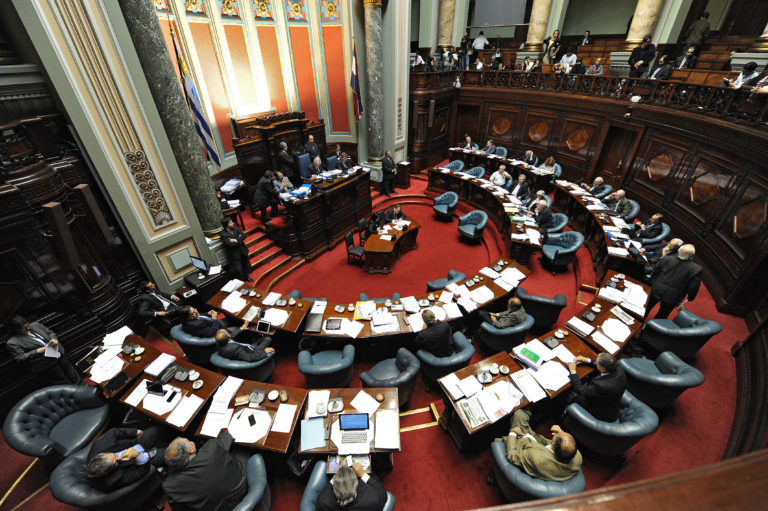In a letter to the President of Uruguay's House of Representatives, WPFC congratulated him for the approval of a historic bill that eliminates the crime of insult and decriminalizes all forms of defamation.
(WPFC/IFEX) – In a letter to the President of Uruguay’s House of Representatives, Dr. Roque Arregui, WPFC congratulated him for the approval of a historic bill that eliminates the crime of insult and decriminalizes all forms of defamation.
June 11, 2009
Dr. Roque Arregui
President
House of Representatives
General Assembly of Uruguay
Legislative Palace
Montevideo, Uruguay
CC to the distinguished members of the Constitution, Policies, General Legislation and Administration Committee: Javier Salsamendi, Beatriz Argimón, Gustavo Bernini, Gustavo Borsari, Diego Cánepa, Luis Alberto Lacalle, Alvaro Lorenzo, Edgardo Ortuño and Jorge Orrico.
Distinguished Dr. Arregui:
The World Press Freedom Committee ( http://www.wpfc.org ) – an organization representing 44 press freedom groups from throughout the world – expresses its great satisfaction on the passing of the bill eliminating the crime of insult and decriminalizing defamation in its various forms, a decisive step for press freedom not only in Uruguay but throughout the Western Hemisphere.
The bill – introduced by President Tabaré Vázquez and initiated by civil society, including several members of the media, such as Búsqueda magazine – was drafted in accordance with the 2007 agreement between the Uruguayan State and the Inter-American Commission on Human Rights.
The bill eliminates all insult crimes, whether spoken or in writing, and expressly states that no one will be punished for expressing disagreement with public officials. Also, the bill eliminates the crimes against national symbols and attacks against the honor of a foreign head of state.
The initiative would correctly decriminalize defamation when those expressions refer to “issues of public interest involving both public officials and public persons who, because of their profession or activity, enjoy a social relevancy or any person who has chosen to be involved in public affairs.”
The bill also respects the concept of real malice as a fundamental standard to evaluate these matters, which would also protect inaccurate expressions by “considering the real will of a person to aggravate or violate the privacy of another person.”
The legislative project is the result of a friendly agreement finalized in September of 2007 between the Uruguayan State and the Inter-American Commission on Human Rights about the criminal defamation conviction against journalist Carlos Dogliani, initiated in your country in 2004 by the mayor of the town of Paysandú.
The case went all the way to the Supreme Court, which ruled that the right to a person’s honor limits the right to free expression. Also, the magistrates dictated that the factual base of the information was not a relevant aspect of the defense and that even an accurate piece of information can constitute defamation.
The inter-American system rightly agreed that Mr. Dogliani was the victim of a great injustice and following a long process, the Uruguayan State agreed to a profound reform of its laws according to the Commission’s guidelines.
Insult laws constitute an effective weapon of intimidation and repression of the free flow of ideas and expressions. These laws are the legacy of a colonial or autocratic past that found their origins in the Roman Empire, which created them to shield the emperor from the criticism of the people.
Criminal defamation laws constitute a veritable Damocles sword dangling over the heads of Uruguayan journalists, who risk their freedom or livelihood or both merely by fulfilling their duty of keeping the public informed, as it was the case of Mr. Dogliani.
Both sets of laws present a clear challenge to the recommendations and jurisprudence of the inter-American system of justice, which has concluded that insult laws must be completely eliminated from the legislation of member states and that defamation statutes should be part of civil codes, and never criminal ones.
It is with great satisfaction that we express our congratulations not only to you but also to the full Congress and to President Vázquez, who will sign the bill into law in a few days, on the happy conclusion of this process of reform, which no doubt will serve as a model for other countries in the Hemisphere.
Respectfully,
E. Markham Bench
Executive Director
World Press Freedom Committee
RECOMMENDED ACTION:
Similar appeals can be sent to:
Dr. Roque Arregui
President
House of Representatives
General Assembly of Uruguay
Legislative Palace
Montevideo, Uruguay
E-mail: rarregui@parlamento.gub.uy
Please copy appeals to the source if possible.


